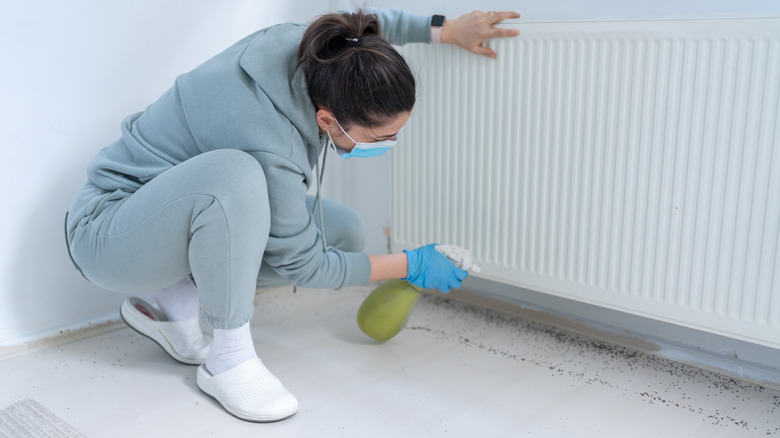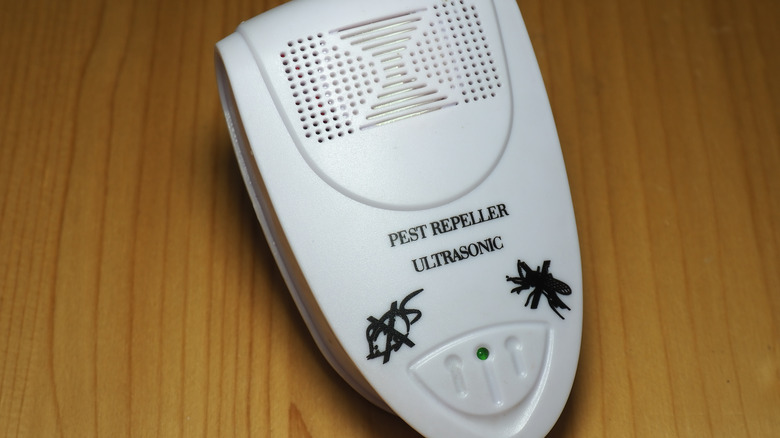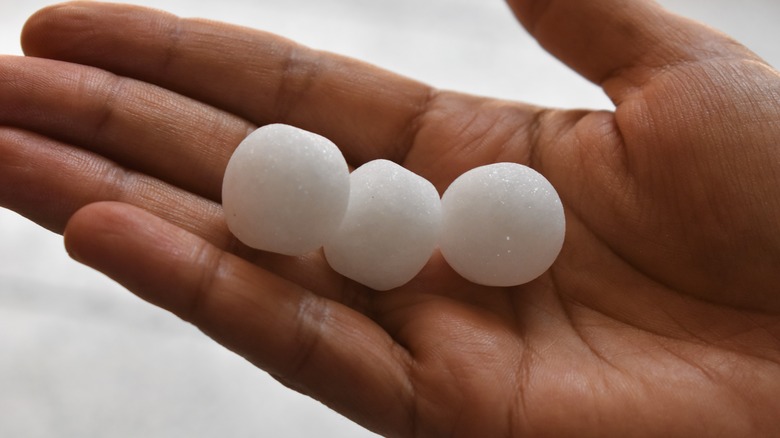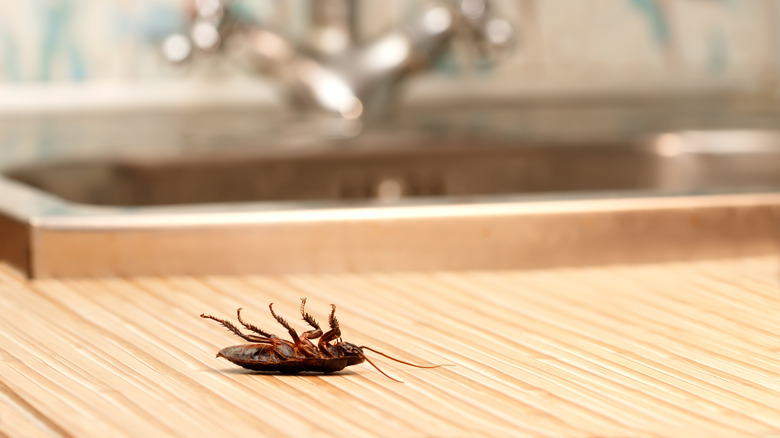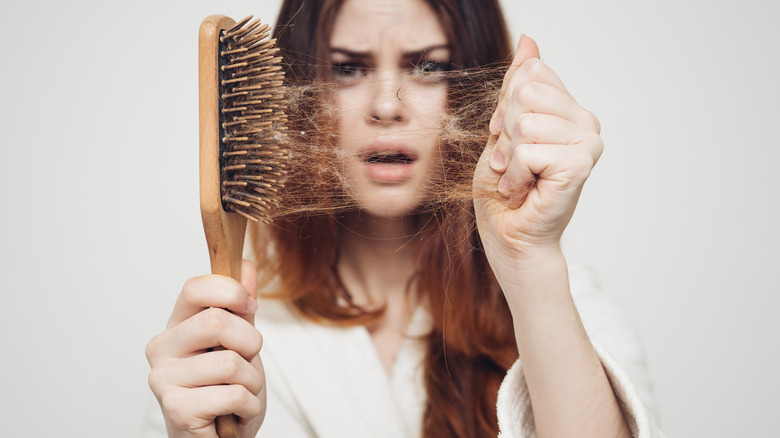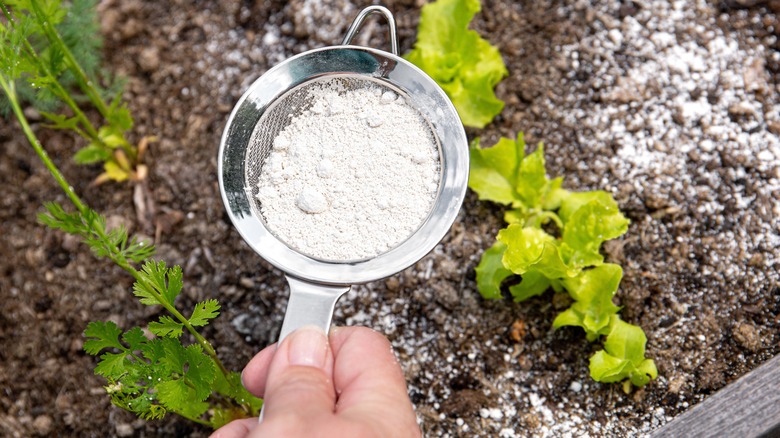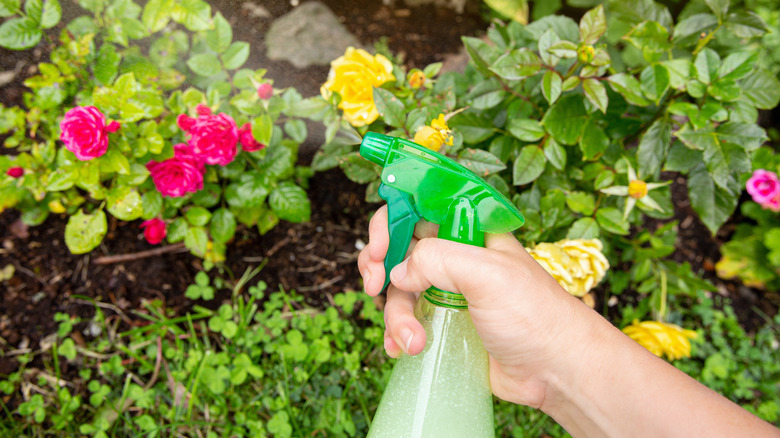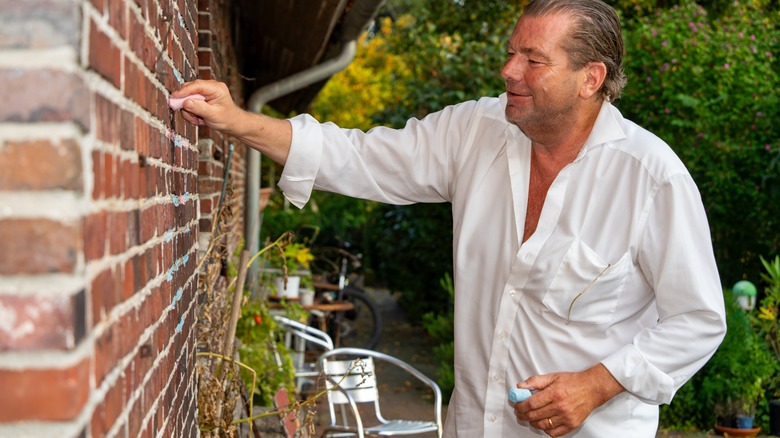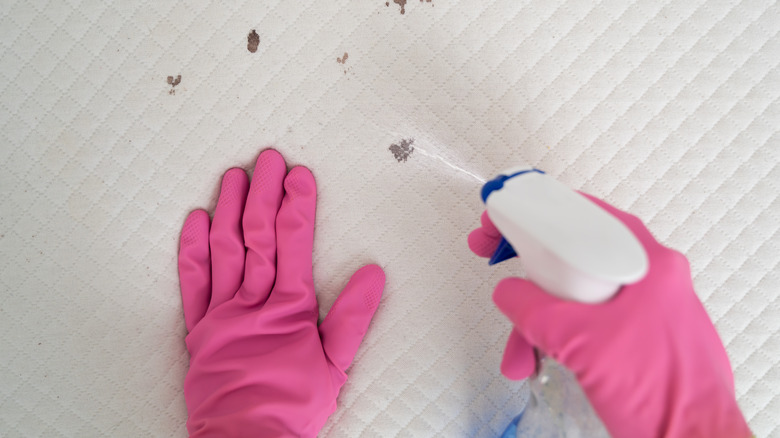Popular Pest Removal Hacks That Don't Actually Work (And What To Try Instead)
When trying to keep pests out of your home and looking for helpful tricks, you get flooded with tons of advice about DIY pest control hacks and home remedies. From using essential oils to ward away bugs to spreading mothballs to get rid of rodents, you can find these tips all over social media and blogs. However, some of these hacks do give you a quick fix, but most of them won't have science or evidence backing them, and they may create a bigger problem than you currently have.
For example, putting cucumber slices or peels around to repel ants or putting certain plants around the house, which will get rid of insects, may seem eco-friendly and simple, but you only get temporary relief. They don't tackle the underlying issue, allowing the pests to return. Also, not using DIY solutions correctly — like mixing baking soda and sugar to kill roaches — can backfire, negatively impacting your home or your pets.
So, while you may be tempted to try out a quick and natural remedy, understanding why they don't work and what is more effective can save you money, time, and a lot of trouble. We'll highlight popular, but ineffective, pest removal hacks, what can go wrong, and give you more reliable alternatives to ensure you keep your space pest-free.
Cucumber slices or peels to repel ants
It's common to believe that putting cucumber peels or slices in your home in the entryways will repel ants, and it comes from the idea that ants don't like how cucumbers smell, so they try to avoid areas with it. Unfortunately, cucumber peels or slices are ineffective and are unreliable in helping control ants. It's possible that cucumbers will briefly mess up the ants' pheromone trails, but that won't stop them from getting in. It can also bring in bugs, as the cucumber peels or slices break down, making the problem worse.
Since cucumber isn't a reliable ant repellent, you need to find more reliable methods, like water and vinegar. Prepare a 1:1 solution of vinegar and water to clean any areas where you see ants. The vinegar's acidity and strong scent can disrupt any pheromone trails the ants leave to help find food, which wards them away. Use your vinegar and water mixture to regularly clean countertops, floors, and entry points for the best results. Also, clean up any food residues, spills, or crumbs to avoid attracting more ants.
Ultrasonic pest repellers to keep pests out
Ultrasonic pest repellers are devices that let out high-frequency sound waves that insects and rodents don't like. Theoretically, these sound waves will drive them away, and all pests dislike them. However, research and findings collected by The University of Arizona show that they're primarily ineffective or have shaky proof behind them, as the tests weren't in a controlled environment. Additionally, the repellers don't address the infestation's root causes or access to shelter and food.
To keep pests out, create an integrated pest management plan. Install weather stripping around the windows or under the doors and consider putting out bait traps for cockroaches or ant infestations. Keeping your home clean is also essential; clean up any spills or crumbs promptly. It's also a good idea to store your food in sealed containers, and take care of your garbage and recycling weekly. Live or snap traps will help get rid of rodents, and taking care of pests as soon as you find signs can stop infestations from getting severe.
Mothballs to repel rodents
Mothballs are a typical hack to repel mice and rats, and you do it by putting mothballs in areas around your home where rodents run through or nest. The hack claims that the active chemicals in mothballs (naphthalene and paradichlorobenzene) give off an overpowering scent for rodents, driving them away. However, this won't work well because, while mothballs are toxic and their vapors will work on moths or fabric pests in closed spaces in large amounts, they don't do well in open areas. Mothballs also are a risk for your pets if they get into them.
Instead of dropping mothballs around your home, sprinkling black pepper is a more humane method, and the scent is strong enough to carry in open areas. You should seal cracks or holes in your exterior walls, around pipes, baseboards, doors, and windows with caulk or steel wool so the rodents have difficulty getting through. Put snap traps in any areas you see them running with the trigger facing the wall, and bait them with things like peanut butter or bacon to make them appealing. If this doesn't help, contact an exterminator for more comprehensive control solutions, like structural modifications or bait stations, to prevent further infestations.
Baking soda and sugar to kill roaches
A popular DIY pest control idea is to mix sugar with baking soda and set it out to kill roaches. The theory is that the sugar attracts them, and the baking soda kills them. However, there are several reasons why these results are inconsistent. For the baking soda to reach lethal levels, the roach has to ingest enough, which isn't guaranteed. Also, it may kill individual roaches, but it doesn't get to the root of a more significant infestation to eliminate them all. Additionally, when using sugar and baking soda to get rid of roaches, most hacks miss a huge element: water. Without it, the roaches eating baking soda won't necessarily lead to dehydration. This oversight means that this hack misses addressing the roaches' nesting habits and how they feed, making it flawed. Sugar may even attract more pests or feed the surviving roaches.
Instead of using this method, switch to gel baits. They're very effective because they attract roaches using taste and scent, and they take whatever they ingest back to the nest, poisoning the colony. This is a very quick method for getting rid of many roaches in one go, instead of trying to kill them off one by one, like with the baking soda and sugar hack. Along with setting out gel baits, store your food in sealed containers, manage any garbage, and clean all your kitchen surfaces to remove crumbs or food residue to make it less tempting for roaches.
Hair to repel rodents
One natural method people try to get rid of mice or rats around their homes is sprinkling human hair. This myth suggests that rodents don't like how human hair smells because it indicates people are around. However, there is no scientific evidence to support this. Rodents aren't usually intimidated by human scents, and they often get drawn to where people are for potential food and warmth. Also, hair breaks down slowly and can worsen household dust, exacerbating allergens. Rodents are adaptable, meaning they need consistent and proven deterrents to keep them out.
Take a multi-faceted approach to remove rodents, sealing entry points with caulk or steel wool. Focus on any holes, cracks, or gaps in the home's exterior where they can slip through, and seal around where pipes enter. Setting snap traps with peanut butter, nuts, or cheese as bait can effectively kill rats and mice. Put them along walls, under sinks, and in corners where rodents run. For a more persistent problem, you may have to break out the chemical bait or call an exterminator. Chemical-based baits kill rodents, but you have to be careful because they can poison your pets or kids if they get into them. Contacting an exterminator will help you safely and effectively get rid of the rodents by having them assess how bad the infestation is and put strategic measures in place to eliminate them. They may also offer long-term prevention techniques to stop them from returning.
Essential oils to repel all pests
Natural remedy enthusiasts claim that essential oils are the way to get rid of all pests. These oils come from plants like lavender, peppermint, or tea tree, and they have a reputation for repelling a host of insects with their scents. You can use essential oils to repel some pests temporarily, but to get them to work, you must match them to the pest, apply them frequently to keep the scent strong, and have the right concentration to make them effective. It's common to misuse these oils, diluting them too much for them to be effective. So, this makes them an unreliable solution for pest control, despite various claims saying otherwise.
The first step for pest control is to determine which pests you have and use a targeted treatment strategy. Commercial-grade insecticides and pesticides work to eliminate one or two specific pests, and they're a lot more effective than essential oils. For example, using a pyrethrin-based spray will get rid of flying insects, while baits work well for cockroaches or rodents. Always follow the instructions when you apply your chemical treatments to ensure they're effective and you stay safe. For more extensive infestations or those that have dangerous pests like wasps, it's best to call an exterminator. They'll have access to a broader range of products and techniques to safely remove the pests and stop them from returning.
Plants to repel pests when planted around the house
Many people believe if you plant certain things around the house, like lavender, citronella, or marigolds, they'll form a natural pest barrier. The theory is that the strong scents will deter different pests, including ants, flies, and mosquitos. While it's true that some plants have mild pest-repelling qualities, their potency are too limited to reduce the pest populations around your home significantly. Pests adapt and may get used to the odors if you don't combine them with other pest control methods. Also, environmental factors like rain or wind can mute the scent, making them less effective if that's all you use.
Using only plants to control the pests won't work, but you can combine them with other strategies for better results. Remove water, food, and shelter sources from your yard, and seal any wall openings. Fix your leaky pipes and store your food in airtight containers to make the area less appealing. Clean up crumbs and spills as soon as they happen and declutter prime nesting spaces. If you want natural pest control methods, bring beneficial insects that eat the bugs, like ladybugs or praying mantises. You can also call an exterminator if you have a significant infestation, and they'll apply treatments that target specific pests, recommend long-term strategies, and use chemical and non-chemical treatments to keep your home pest-free.
Organic products as always safe and effective forms of pest control
The common belief that all organic products work well for pest control is misleading. Organic products, like those from minerals, plants, or animals, are marketed as safer and healthier alternatives for pest control over synthetic chemicals. While they're nice to use to be more eco-friendly and safe, their effectiveness can vary. Some organic products don't work well or need you to reapply them a lot to be even slightly effective. Also, organic doesn't necessarily mean it'll be completely safe, because some natural substances can be toxic to people and pets. For example, diatomaceous earth can work against some insects, but there are consequences if you accidentally inhale it.
Instead of organic products, consider incorporating approved and tested commercial-grade pesticides and cleaners. These products come specially formulated to tackle a broad range of pests, and authorities regulate them to ensure they meet strict safety standards. If you're worried about chemical exposure, traps and baits are effective in helping target specific pests, rather than broadly spraying chemicals. Rodent and insect baits have a contained, small pesticide dose that limits exposure. Regularly cleaning your home is also essential to eliminate potential food sources, and it's a good idea to call in a professional for large infestations to get strong, targeted treatment options.
DIY dish soap spray as always safe on plants
Many garden-centered blogs recommend spraying a mix of water and dish soap on your plants to help with pests. They claim it's a safe, natural alternative to using chemical-based pesticides, and they say that dish soap is harmless to plants, while controlling mite and aphid populations. However, the reality is different. Dish soaps break down grease and aren't created for use on plants. Their chemical composition can strip the natural waxes from the foliage, which shields the plants from diseases and pests. It can lead to stunted growth, burned foliage, and plant death. Also, while dish soap might kill some pests, it's usually ineffective against more extensive infestations and doesn't do anything for future pests.
Instead of risking your plants, go for insecticidal soaps specifically formulated to kill pests on your plants. They are designed to eliminate infestations without impacting the plant, and they penetrate the insects' soft bodies, like spider mites and aphids, and suffocate them. Applying it early in the morning or later in the evening helps it avoid direct sunlight and leaf burn. Cover both sides of the leaves and repeat as instructed, typically every four to seven days. Think about introducing lacewings or ladybugs to the garden, as they devour harmful pests. Whatever you use, carefully try it on a tiny section of the plant before soaking it to ensure it won't cause damage.
Chalk lines to stop ants
A common myth tells you to draw chalk lines around your home's entry points to stop ants from crossing the threshold. The idea behind this myth is that the chalk will disrupt pheromone trails, and ants use these to navigate. Chalk lines may momentarily confuse the ants but do nothing for the underlying infestation issue. In reality, ants adapt and quickly find other routes to get in. Chalk is also temporary and limited, and it only impacts ants that run across the line. The chalk is also messy and needs to be reapplied or touched up frequently. It doesn't do anything about the colony or invasion source, which means that you may see fewer ants, but your overall problem will hang around.
To get rid of an ant problem, you have to target the whole colony, not just the ants you see running around, and this is what ant baits do. Baits attract ants and have a slow-acting insecticide mixed with a food source. The ants return the bait to the colony, share it with the queen and other ants, and kill the colony's source. Put your baits along any trails you see and around entry points and replace them as the instructions tell you to. Depending on the ant type and colony size, this can take a few days or weeks. Clean the kitchen and other areas so you don't attract more ants, and seal cracks where ants can get in.
Vinegar to kill bed bugs on contact
Many people think that vinegar gets rid of bed bugs, and the myth says if you spray it directly onto them, it'll kill the bed bugs on contact. While vinegar can help remedy your bed bug problem in a pinch, it won't eliminate an infestation and is better used as part of a more comprehensive attack. Since it only kills what it encounters, it won't do anything to hidden bugs or unhatched eggs. Also, vinegar evaporates quickly and won't leave a residue that keeps killing the bugs. So, it offers zero preventative properties, because any bed bugs left after the treatment will breed. Vinegar also has a sharp, lasting smell when used in large amounts.
Dealing with bed bugs requires a stronger approach. Heat treatment is one of the most effective ways to get rid of them during all stages of their life. You'll heat the room to lethal levels for the bugs, between 113 and 118 degrees Fahrenheit, for roughly 90 minutes. Professional pest control services can do this to ensure the heat gets into the mattress, furniture, and other hard-to-reach spots to kill all the bed bugs. Chemical treatments are also available, and you want professionals to apply them for the best results. Also, get bed bug-proof covers for your mattresses and box springs, get rid of clutter, and vacuum regularly to make it harder for them to survive.
Salt to kill a flea infestation
DIY enthusiasts claim salt can dehydrate fleas, and it'll pull moisture from their bodies if you sprinkle it over furniture and carpeted areas. However, although there are several genius ways to use salt around the house, this isn't effective because it has to be in direct contact to do anything. Also, it won't do anything to flea eggs, allowing the infestation to continue.
To fight an infestation, use products designed to control the pests, like flea powders or sprays. They'll take out eggs and adults, and they usually have insecticides that are safe to use inside and can reach into cracks and crevices to get them all. Vacuum the infested area to remove any flea eggs, fleas, larvae, and debris before applying the flea treatment. Once the treatment is on, allow it to sit as long as the package suggests before vacuuming again to remove excess product and dead fleas. Wash all your bedding, cushion covers, and throws in hot water to kill any remaining fleas, and treat your home with a flea fogger. Prevent re-infestation by regularly washing pet beds, applying flea control products to your pets, and keeping your home clean.
